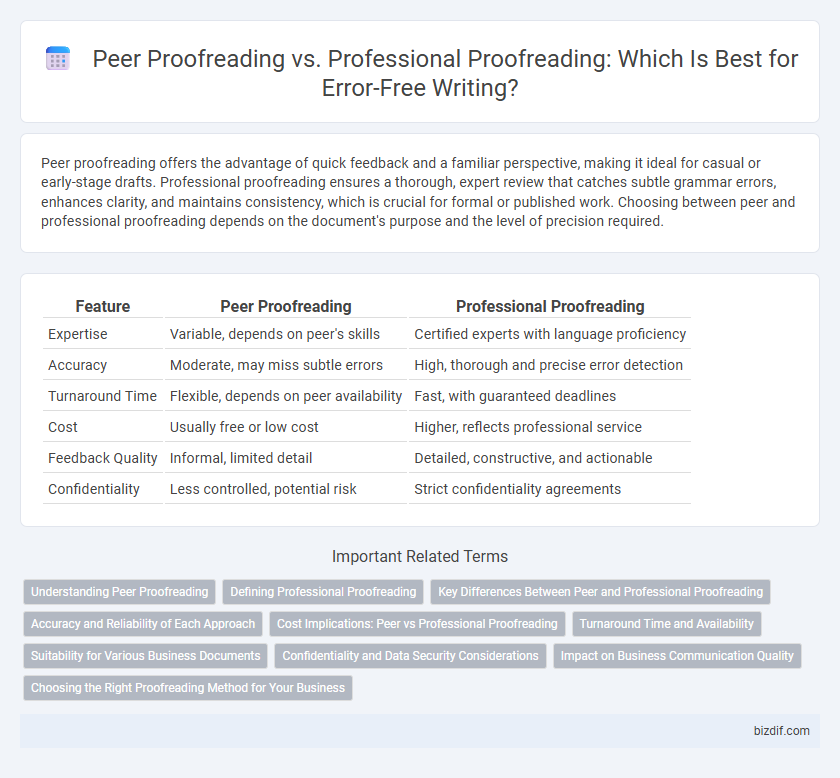Peer proofreading offers the advantage of quick feedback and a familiar perspective, making it ideal for casual or early-stage drafts. Professional proofreading ensures a thorough, expert review that catches subtle grammar errors, enhances clarity, and maintains consistency, which is crucial for formal or published work. Choosing between peer and professional proofreading depends on the document's purpose and the level of precision required.
Table of Comparison
| Feature | Peer Proofreading | Professional Proofreading |
|---|---|---|
| Expertise | Variable, depends on peer's skills | Certified experts with language proficiency |
| Accuracy | Moderate, may miss subtle errors | High, thorough and precise error detection |
| Turnaround Time | Flexible, depends on peer availability | Fast, with guaranteed deadlines |
| Cost | Usually free or low cost | Higher, reflects professional service |
| Feedback Quality | Informal, limited detail | Detailed, constructive, and actionable |
| Confidentiality | Less controlled, potential risk | Strict confidentiality agreements |
Understanding Peer Proofreading
Peer proofreading involves reviewing a text by individuals with similar knowledge or skills, offering valuable insights from a reader's perspective. It helps identify common errors, unclear phrases, and inconsistencies but may miss specialized or technical mistakes. Understanding peer proofreading highlights its role as a cost-effective method that complements professional proofreading for enhanced accuracy and clarity.
Defining Professional Proofreading
Professional proofreading involves a trained expert who meticulously reviews texts to ensure accuracy, consistency, and adherence to style guidelines, often specialized in specific industries or academic fields. Unlike peer proofreading, which relies on individuals who may lack formal training, professional proofreaders use comprehensive tools and expertise to eliminate grammatical errors, typographical mistakes, and formatting issues. Their work guarantees a polished final product that meets high standards of quality and precision essential for publishing, business, or scholarly communication.
Key Differences Between Peer and Professional Proofreading
Peer proofreading offers informal feedback typically from friends or colleagues, often lacking the expertise of language rules and style conventions. Professional proofreading ensures thorough error detection and correction by experts skilled in grammar, punctuation, and formatting standards. The key difference lies in the accuracy, reliability, and depth of linguistic insights provided, with professional proofreaders delivering higher precision and adherence to industry standards.
Accuracy and Reliability of Each Approach
Peer proofreading often provides valuable insights due to familiarity with the topic but may lack the precision and consistency found in professional proofreading services. Professional proofreaders employ specialized skills and tools to ensure higher accuracy, catching nuanced errors in grammar, punctuation, and style that peers might overlook. The reliability of professional proofreading is generally superior, supported by expertise and industry standards, resulting in thoroughly polished and error-free documents.
Cost Implications: Peer vs Professional Proofreading
Peer proofreading typically incurs no financial cost, making it a budget-friendly option for students and casual writers. Professional proofreading services charge fees ranging from $0.01 to $0.05 per word, reflecting their expertise and turnaround time. Choosing between peer and professional proofreading depends on balancing budget constraints with the need for accuracy and quality assurance.
Turnaround Time and Availability
Peer proofreading often offers faster turnaround times due to the informal nature and immediate availability of friends or colleagues, making it ideal for quick reviews. Professional proofreading services, while potentially slower, provide scheduled availability and guaranteed deadlines, ensuring thorough, high-quality edits for critical documents. Availability of professional proofreaders is typically more reliable and consistent, particularly for specialized content requiring expert attention.
Suitability for Various Business Documents
Peer proofreading is often suitable for informal business communications and drafts requiring general feedback, offering cost-effective and rapid review. Professional proofreading excels in formal documents like contracts, reports, and marketing materials where accuracy, consistency, and adherence to industry standards are critical. Choosing between peer and professional proofreading depends on the document's purpose, audience, and the level of precision required to maintain brand credibility and legal compliance.
Confidentiality and Data Security Considerations
Peer proofreading may pose risks to confidentiality and data security since personal or sensitive information is shared with non-professional individuals lacking formal privacy protocols. Professional proofreading services implement strict confidentiality agreements and use secure file transfer systems to protect client data throughout the editing process. Choosing professional proofreading ensures compliance with data protection standards and reduces the risk of information breaches.
Impact on Business Communication Quality
Peer proofreading offers valuable insights from colleagues familiar with industry-specific language, enhancing clarity and relevance in business communication. Professional proofreading provides expert-level precision and consistency, ensuring error-free, polished documents that uphold corporate standards. Both methods improve communication quality, but professional proofreading significantly minimizes the risk of costly misunderstandings and maintains brand reputation.
Choosing the Right Proofreading Method for Your Business
Choosing the right proofreading method for your business depends on the accuracy required and budget constraints, with peer proofreading offering cost-effective, informal review while professional proofreading ensures expert-level error detection and consistency. Peer proofreading suits small businesses or early drafts where collaborative feedback is valuable, whereas professional proofreading is essential for polished, publish-ready documents demanding high precision. Investing in professional proofreading can enhance brand credibility and prevent costly errors that peer review might overlook.
Peer proofreading vs Professional proofreading Infographic

 bizdif.com
bizdif.com